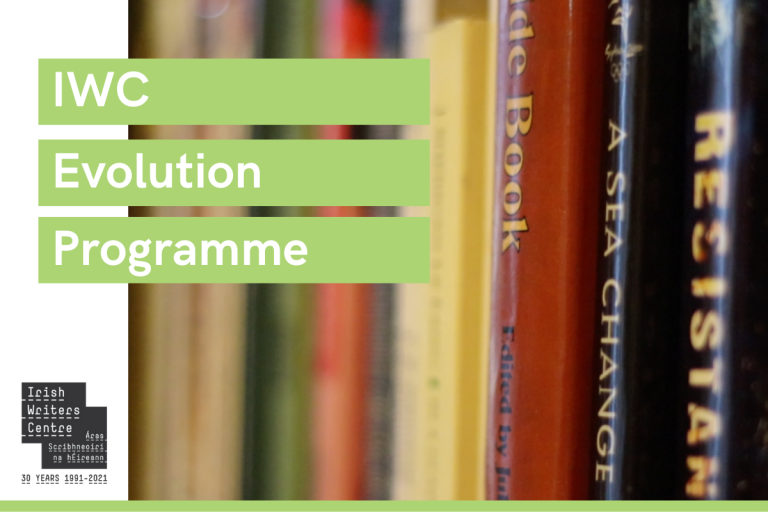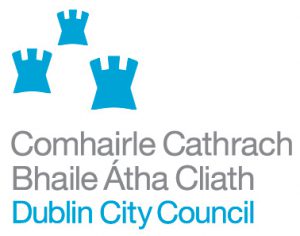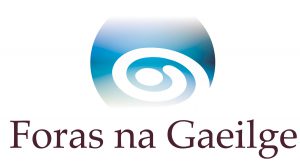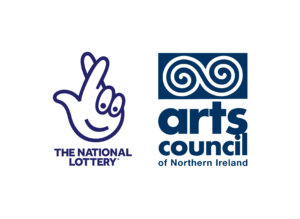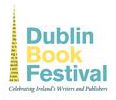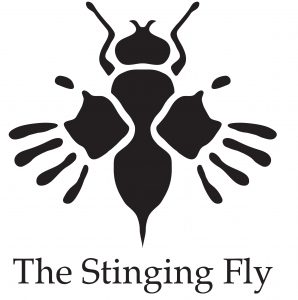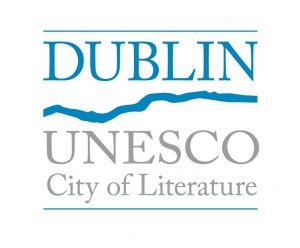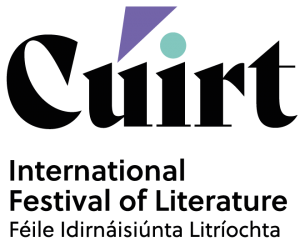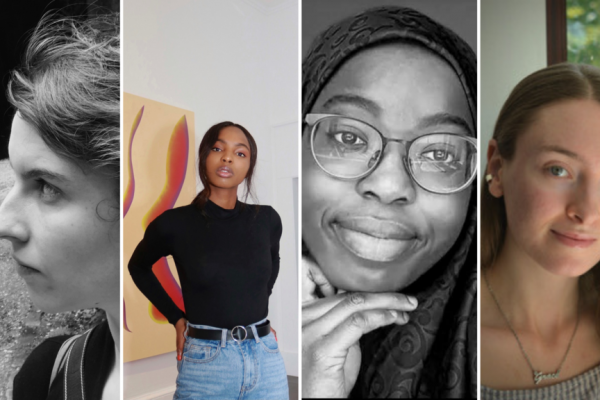
15 June, 2021
Young Writer Delegates reflect on ILFD 2021
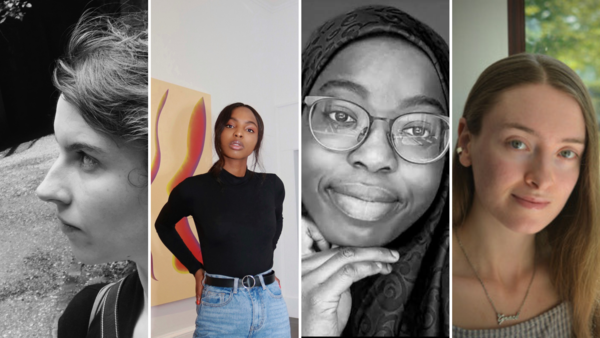
Last month, book lovers across the country tuned in to the International Literary Festival Dublin 2021. Attendees were treated to 10 jam-packed days full of readings, conversations, debates, screenings, guided walks, events, podcasts and broadcasts, spanning the genres of fiction, poetry, non-fiction, theatre, music and screenwriting. Now in its second year operating online, the programme was immersive, exciting and definitely did not disappoint.
Among the attendees were our IWC/ILFD Young Writer Delegates Grace Banks, Fadilah Salawu, Emer O’Hanlon, and Olamide Alao. Here is what they thought of the experience.
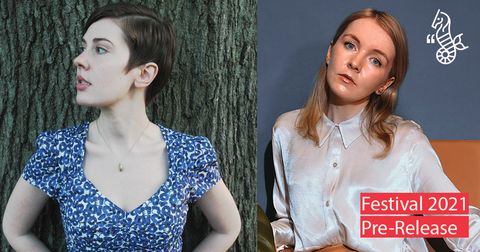
Everyone is Talking About Patricia Lockwood & Roisin Kiberd, review by Grace Banks
On Day 3 of ILFD 2021, Adrian Weckler interviewed Patricia Lockwood and Róisín Kiberd on their respective internet-themed books, “No One Is Talking About This” and “The Disconnect: A Personal Journey Through the Internet”.
We often talk of the internet as a ‘virtual’ world, somehow less real than the world occupied by our physical bodies. Both Róisín and Patricia however brought out the materiality of the online realm, as an extension of physical reality. Patricia expressed the idea that users of Facebook experience the platform as an extension of Mark Zuckerberg’s body and of the way his mind works. Róisín seconded this, adding that Zuckerberg is akin to a medieval king who has two bodies, his physical body and that of the state or, in Zuckerberg’s case, the corporation. Patricia also spoke of a bubble to the left side of her temple that appears when she closes her eyes, in which the constant drone of what she calls ‘the portal’ continues all the time. Both speakers construed the internet as a kind of Siamese twin attached to each of us: we are connected and follow one another around, with give and take on either side. Just as there is a corresponding Google location for every square centimetre on the planet, so too is there what Róisín called a ‘ghost’ of ourselves that will live on as data long after we have died, and not just the social media profiles we consciously create but also data about where we’ve been, who we’ve interacted with, what we buy, and more. This intimacy between us and our online selves was one of the reasons Róisín cited for the personal nature of her essays: the subject of the internet will always demand a personal take, since the services she writes about apparently know her better than she knows herself. That people only present the best image of themselves on social media is now a well-worn cliché, but both Róisín and Patricia are also acutely aware of the selves we create unconsciously online.
These ideas of selfhood were a constant thread throughout the interview. Róisín spoke of her Borderline Personality Disorder diagnosis and how it creates in her an absent sense of self, a sense of self which the internet seductively promises to create for us. Róisín described social media as “a constant act of self-fashioning,” but one in which that self is always being destabilised. Róisín and Patricia agreed that platforms like Facebook took the process of self-invention and formalised it into a basic questionnaire, in contrast to the early days of the internet when people were encouraged to create more rounded personas online. Róisín ruminates on the logical endpoint of this process in the extract she read from The Disconnect, in which she wonders what will happen when Facebook’s algorithm works against itself, when we all eventually consume the same content and as such become a homogenous personality without the idiosyncrasies that make our data so valuable.
Listening to Róisín and Patricia speak was a welcome tonic – in particular their embracing of the weird and wonderful side of the internet, and their refusal to employ the same reactionary attitude towards its dark side as it supposedly fosters in its users. What was most refreshing, however, was to hear the online world spoken and written of with such nuance and intelligence, and to know that these two authors have given it the respect it deserves both as a philosophical and a literary subject. It is really only surprising that it has taken more than twenty-five years for it to be treated as such.
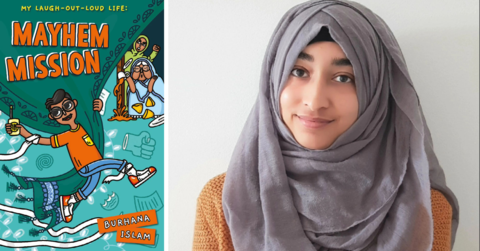
The Unmissable Mayhem Mission with Burhana Islam, review by Fadilah Salawu
In this warm and casual conversation between author Burhana Islam and skilled interviewer Alexandria Turner, we got to learn more about Burhana’s latest book ‘Mayhem Mission’, and her reflections on writing for children, inspired by children, representation in children’s books, as well the importance she gives to children’s literature that meaningfully expands their world view and broadens their minds.
Explaining the premise of the story, the book follows the main character, British-Bengali Yusuf, in his mission of preparation for his older sister’s wedding. Based on the happenings before and during her own wedding, Burhana was keen to mention the fond memories she had, thus filling her children’s book with ‘food, moments of family, love, sibling rivalry and absolute chaos!’
Throughout the interview, Burhana drew us into the world of Yusuf, and by extension, her own family. She spoke passionately on what it meant to have a book that showcased her South-Asian and British heritage and culture, as well as her Islamic faith. One such celebration of culture is through traditional Bengali dishes: she mentions how she hadn’t realised that her book was so full of food until someone had pointed it out to her, and laughed at her looking back and finding food on almost every page. A particular dish described her family’s unique and non-traditional fish take on a Bengali dish traditionally made with chicken – Burhana speaks warmly of her past voyage with pescetarianism and her family’s subsequent culinary adaptations, drawing us closely into her personal world and unveiling the inspiration behind the decisions made in her writing.
She also explained the unique blend of languages in Yusuf’s story: English, Arabic, and Bengali, a mixture she fondly refers to as ‘Benglish’. She states pointedly that none of the non-English words are italicised, reflecting the natural speech of the young main character. She highlights the seamless and unspoken blend between the layers of Yusuf’s British, Bengali and Muslim identity in the book. As well as this, her children’s voice is natural and authentic, as having spent time teaching children Yusuf’s age, she kept true to the natural humour of children’s’ voices.
Burhana’s writing is full of conscious challenges to matters of identity through her writing for children. On the reason behind writing of many of the young characters with South-Asian names, she explains: ‘to this day, I’ve never seen my name in a book, except for my own author name’. She hopes that by including names familiar to children of South-Asian backgrounds, such as those of her nieces and nephews, as characters, children will feel represented in Yusuf’s story. As a primary school teacher, Burhana states how important it is for children to feel represented in literature, as it includes them and excites them about the world of reading. She recounts the expressions of her many students and family members who identify greatly with the book, thrilled to see their and their friends’ names and to hear familiar cultural and religious themes throughout the story.
Burhana was aware that her book was full of many funny moments, and would be classed as a comedy, but was eager to point out that pure comedy in children’s literature is not enough. Writing a book that only served for laughs has never appealed to her: ‘I don’t want to ever write a book that doesn’t have heart’ she says, stating that children deserve literature that is ‘meaningful’ and that encourages growth in their worldview, empathy, and character development. She hopes that between the laughs on each page, readers of all ages are able to read into the deeper lessons in the story.
Burhana proudly let the audience know that she had sped through the writing process for children’s books, writing Mayhem Mission in just three months and having it published the year after it had been written. Ending the interview with a brilliant and evocative reading, and letting us know that we can expect at least two more books in the series of Yusuf’s Laugh-Out-Loud Life, Burhana Islam is certainly a positive and powerful new voice in the children’s’ literature scene, and certainly isn’t going anywhere for a while.
This early morning event near the beginning of the International Literature Festival certainly set the tone for the coming waves of thoughtful, creative, and diverse guests, new and old, making their mark in various genres of the literary world.
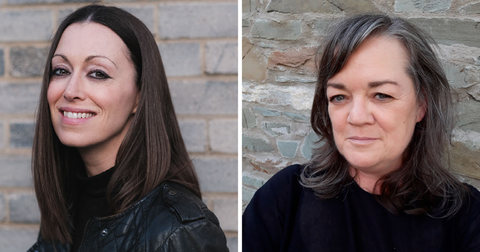
Underneath the Skin: Lucy Caldwell & Louise Kennedy, review by Emer O’Hanlon
Lucy and Louise are both sincere and generous speakers, and in their conversation with Anna Carey, they covered everything from writing practice to forgotten female authors to the eternal appeal of the ‘heightened reality pulled taut’ short story form.
History —how we make use of it as writers, and how it affects us personally — a topic returned to throughout the afternoon. Louise Kennedy’s research interest in Norah Hoult (whose overlooked output Lucy described as a choice, ‘to let [certain] writers fall out of the canon, out of the respect of the literary world’) led into a more general discussion forgotten female writers, both in Ireland and further afield, with both writers agreeing that Sinead Gleeson’s landmark women-authored anthologies were a crucial turning point in the Irish literary landscape. Meanwhile, Louise likened her story ‘Beyond Carthage’ to a re-writing of her own personal history: ‘I was looking back at being in my twenties and seeing these older women with younger fellas and thinking they were ridiculous —but why?’ Focusing her narrative on those same older women allowed her to re-interpret them.
For Northern Irish writers, the shadow of the Troubles, the pressure to ‘tackle the Issues’, can loom large. Louise admitted, somewhat reluctantly, to finding the Troubles a recurrent source of inspiration (‘I sort of wish it didn’t!’). By contrast, Lucy talked in more general terms about the legacy of recent history on contemporary Northern Irish writing. The Good Friday Agreement, she said, afforded writers a vital breathing space. Time to write ‘allows for a masterpiece like Milkman […] There are stories about the Troubles that still need to be told, but there are other stories too. The more stories there are, the less you worry about the burden of representation.’
Lucy was candid in talking about her own sustained reluctance to write ‘in the voice in my head’. he stories in her first collection, Multitudes, were her way of overcoming this: ‘There was a real freedom in deciding to tell these stories of young girls from Northern Ireland’. She, too, has revisited her own past through her short fiction, and perhaps it’s no coincidence that Multitudes has its fair share of child and teenage narrators. This breathing space to allow voice to develop is something Louise also advocates for, as an impassioned critic of the ‘youth obsession’ of contemporary prizes and their age limits. Sustained support, both agreed, was vital for writers at all stages and times of life.
But what makes Lucy and Louise such likeable and enjoyable speakers is the fact that they are both enthusiastic readers, as well as writers, of short stories, and their conversation consequently has a real engaging and honest quality. In a nitty-gritty discussion about the best way to order a short story collection, Lucy openly labelled herself ‘quite perverse’ as a reader, not always reading in order but instead choosing the titles she likes most. Louise fielded a question from an anxious new writer by repeating her mantra: ‘write whatever you like, change all the names later.’ Their admiration for each other’s work is genuine and contagious, with Lucy never more enthusiastic than when waxing lyrical about her favourite turn-of-phrase in Louise’s collection, The End of the World is a Cul-de-Sac: ‘She lay her on the bed to change her. There seemed to be more shite than child.’

What’s Next? Emma Dabiri, review by Olamide Alao
I really enjoyed this event for several reasons. Firstly, the content of the talk was quite engaging and thought provoking. Also, before joining the session I was reluctant to read the book by Emma Dabiri as the name read like a handbook for white audiences; ‘What White People Can Do Next: From Allyship to Coalition’.
The event began with a short introduction and a recap of Emma Dabiri’s experience in academia and her other works. This was followed by a reading from the book about allyship and issues it presents. Much of the conversation focused on the events that occurred after the death of George Floyd, its impact and how we can learn from this. The question of whether handbooks entailing what white people should do arose, and whether they are necessary or even effective. Throughout the event it was clear that the book was much more than a handbook. It presented a critique on cancel culture, and some elements of social media culture today. Dabiri encouraged young and older people of all backgrounds to critically think about racial issues, by noting the nuances that may exist in a place like Ireland, and how it can help in tackling these issues. This may be in the capitalisation of ‘black’ and ‘white’ or understanding the possible intersection between class and race.
This session later ended on a discussion on the role of academia in the current social media moment. The role cancel culture plays in pushing discourse and the issues it may present. Drawing on the example of Angela Davis, Dabiri noted how many academics find it difficult to share quite opposing views to the masses online and how this negatively impacts academics as we know them. After attending the event I was encouraged to read the book and to think further about racial dynamics, critical thought and their relationship in the Irish context.
The Irish Writers Centre is Ireland’s national resource centre for Irish writers and Irish writing. Have a look through our website at the opportunities and writing courses we have on offer.


